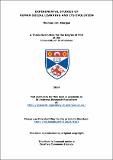Files in this item
Experimental studies of human social learning and its evolution
Item metadata
| dc.contributor.advisor | Laland, Kevin N. | |
| dc.contributor.author | Morgan, Thomas J. H. | |
| dc.coverage.spatial | 231 | en_US |
| dc.date.accessioned | 2014-02-14T11:52:53Z | |
| dc.date.available | 2014-02-14T11:52:53Z | |
| dc.date.issued | 2014-06-25 | |
| dc.identifier | uk.bl.ethos.595632 | |
| dc.identifier.uri | https://hdl.handle.net/10023/4443 | |
| dc.description.abstract | Human culture is unique in its scope and complexity and is underpinned by the social transmission of information. Successful individuals will use both social and asocial information effectively. Evolutionary theory suggests that social learning should be guided by evolved learning rules that dictate when individuals rely on social information, a literature which I review across Chapters 1 and 2, with the emphasis of chapter 2 being on conformist transmission. In this thesis I present experimental investigations of the existence and adaptive value of several such strategies in both adults (Chapter 3) and young children (Chapter 4). In all cases I find strong evidence for the existence of such biases and show that they act to increase the accuracy of decisions. In particular I show individuals are highly sensitive to even small majorities within a group of demonstrators. The youngest children (age 3) however, show little sensitivity to social information and do not use it effectively. In Chapter 5 I present an investigation into the role of social learning in the evolution of hominin lithic technology. I conclude that even the earliest hominin flaking technology is poorly transmitted through observation alone and so the widespread and longstanding persistence of such tools implies some form of teaching. Furthermore, I conclude that the stable transmission of more complex technologies would likely require teaching, and potentially symbolic communication. I also postulate a co-evolution of stone tools and complex communication and teaching. In Chapter 6 I conclude that the cultural evolutionary approach, focussing on the evolutionary consequences of social information use and treating culture as a system of inheritance partially independent of genes, seems successful in increasing our understanding of the evolution of social learning. | en_US |
| dc.language.iso | en | en_US |
| dc.publisher | University of St Andrews | |
| dc.rights | Creative Commons Attribution-NonCommercial-NoDerivatives 4.0 International | |
| dc.rights.uri | http://creativecommons.org/licenses/by-nc-nd/4.0/ | |
| dc.subject | Cultural evolution | en_US |
| dc.subject | Social learning | en_US |
| dc.subject.lcc | HQ783.M7 | |
| dc.subject.lcsh | Social learning | en_US |
| dc.subject.lcsh | Social evolution | en_US |
| dc.subject.lcsh | Tools, Prehistoric | en_US |
| dc.title | Experimental studies of human social learning and its evolution | en_US |
| dc.type | Thesis | en_US |
| dc.contributor.sponsor | European Research Council (ERC) | en_US |
| dc.type.qualificationlevel | Doctoral | en_US |
| dc.type.qualificationname | PhD Doctor of Philosophy | en_US |
| dc.publisher.institution | The University of St Andrews | en_US |
This item appears in the following Collection(s)
Except where otherwise noted within the work, this item's licence for re-use is described as Creative Commons Attribution-NonCommercial-NoDerivatives 4.0 International
Items in the St Andrews Research Repository are protected by copyright, with all rights reserved, unless otherwise indicated.


